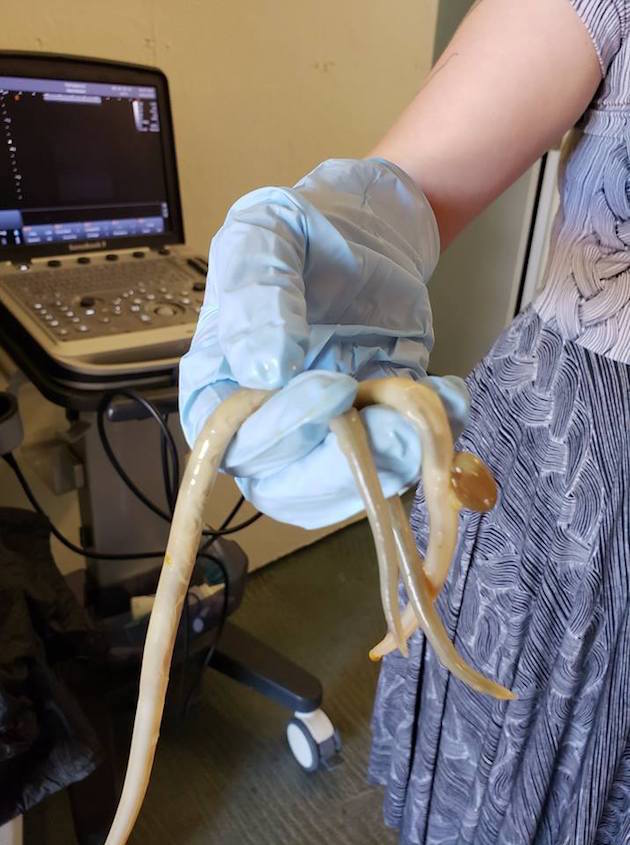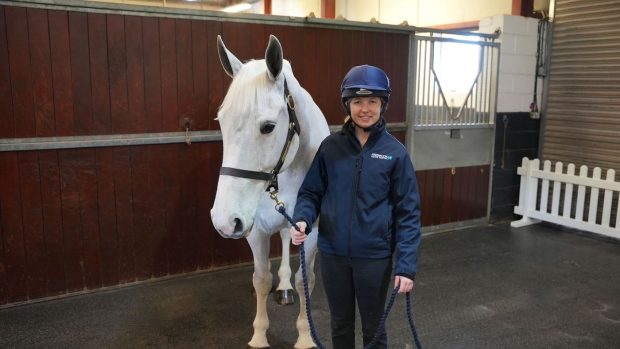A vet has urged owners to be aware of worming horses correctly after a mare with a huge ascarid (large roundworm) worm burden had to be put down.
Doug Thal DVM DABVP of Thal Equine in Santa Fe, US, and creator of the Horse Side Vet Guide told H&H the four-year-old a mare was referred to his clinic with signs of colic.
“She came in and we had to put her on the surgery table, she had a twist of the entire small intestine and I untwisted it. When I opened the intestine to empty it, I found these parasites,” Dr Thal said, adding that he took out 15 roundworms 25 to 45cm in length during surgery, then another 20 came out of a stomach tube over the next few days. The mare underwent surgery again on day three, when it was found a piece of the intestine had died and she had to be put down.

“These are typically a parasite seen only in young horses, but the mare was four,” he said. “By two years old, the immune system typically eliminates ascarids, so seeing these numbers in an adult horse is very rare. I’ve seen horses die from not being wormed, or not being wormed properly. This was the first time I had ever seen such a clear resistance situation.”
In this case Dr Thal said the mare, who is thought to have had a rare immune tolerance to the parasites, had been “aggressively de-wormed”.
“If anything, she had been over-wormed. She was apparently being wormed every five weeks on a rotation with ivermectin and other wormers, and yet the worms were still in her small intestine,” said Dr Thal. “I cannot prove that the parasites were the reason she had the intestinal twist, and were related to the reason she had to be euthanised, but I can’t help think that this contributed.”
Dr Thal said some owners are worming incorrectly due to misinformation.
“People are taking these powerful chemicals and using them randomly, over and over. There are ultimately going to be consequences to that [as the worms build up resistance to the chemicals],” he said. “People think they’re doing good by deworming, but often it’s based on misinformation. Simply throwing wormers at horses is not the right way to think about worming. My advice to people is to understand management to reduce worm burdens, and this requires understanding the basics of a typical worm cycle.
“Adult worms live in the intestines of the horse, eggs are laid. They pass out into the environment in the manure. Eggs mature on the pasture to an “infective” stage, and are re-ingested and the cycle repeats. By understanding this basic cycle, people can make better, more logical worming decisions.
“People should whenever possible pick up manure from paddocks and therefore prevent horses from re-ingesting worms through the manure. Or if horses are on pasture, use appropriate pasture rotation.”

Plea for owners to test prior to worming or risk severe consequences
There has been a call from vets and industry professionals for owners to change the way they worm their horses

Horse dies suddenly due to serious worm damage
An equine vet is urging horse owners to maintain responsible worming programmes - following the sudden death of a seemingly

Ask H&H: How can worm counts help my horse?
Expert advice on the merits of using worm counts to tailor your worming programme rather than routinely worming your horse
Although not relevant in this case, Dr Thal warned owners to seek professional advice before considering alternative worming methods.
“The horse industry is fraught with people who use faulty logic and are not afraid to confidently share their misinformation on social media. Their approach is ‘I did this for my one horse, my horse seems ok to me so this treatment must be effective – now I am going to spread the word to everyone I know that this works’. In the social media age in which we live, this effect is amplified by 1,000, and it can lead to widespread bad decision-making, and horses can suffer as a result.
“My main message is that people need to be careful, be sceptical and ask the right questions. When considering products, ask for scientific evidence. Work with your vet.”
For all the latest news analysis, competition reports, interviews, features and much more, don’t miss Horse & Hound magazine, on sale every Thursday.





